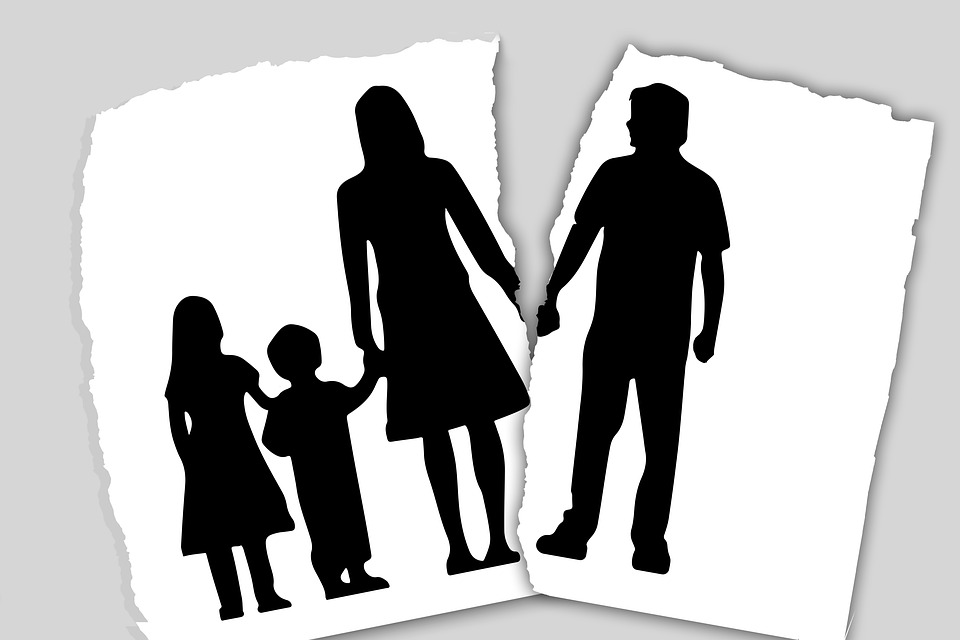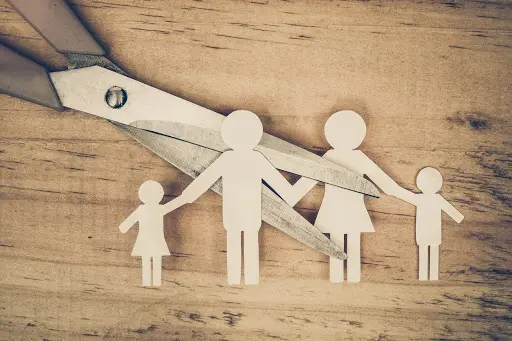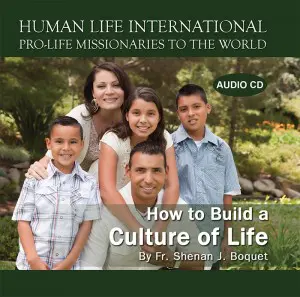Marriage is—and has been—under attack for quite some time. While the latest attacks are fashioned by those who attempt to redefine the authentic definition of marriage to include same-sex relationships, there are many other things that not only harm but destroy this sacred sacrament. We discuss ten of these here.
1. Wounded Human Nature
The book of Genesis reveals that problems between men and women stem from the wounding of our human nature by original sin.
Inclinations toward sin from our wounded nature sometimes lead to bad choices. For example, irrational tendencies can make healthy relationships between spouses difficult. Often couples marry with little or no thought or preparation. Too much attention is frequently paid to the wedding day and honeymoon instead of the focus on a lifelong commitment. When difficulties come, as they inevitably do, couples are often too quick to separate.
Bad choices can be dictated either by pride, lust, power, or greed; yet God tells even Cain that he has the ability to master his evil tendencies (Gen. 4:7). Prayer and the sacraments of Penance and the Eucharist are the remedies for our wounded human nature. Through penance we are absolved of our sins; through the Eucharist we are fed and strengthened to overcome our daily faults and avoid mortal sin.

2. Materialism and Secularism
Our wounded human nature makes things difficult enough, but our decadent, secularized culture exacerbates the devaluation of marriage. Since the 19th century, growing materialism, hedonism, and consumerism have contributed to a cult of selfishness.
As a result of this materialism and selfishness, states have adopted no-fault divorce laws that make divorcing one’s spouse easier. Celebrities who divorce and remarry multiple times serve as poor role models. The birth control pill also contributes to marital infidelity.

Divorce rates [1], which climbed steadily throughout the 20th century, skyrocketed to reach an all-time high of 40 per 1,000 married women in the late 1970s, then declining slightly.
Today, the attack against marriage is even more basic and attempts to change the definition of marriage by rejecting God’s original plan.
Even in the Church, there are those who, in the name of false mercy, would condone the violation of God’s plan for marriage by supporting contraception [2] or allowing Communion for those divorced and remarried without an annulment or for those who support same-sex “marriage.”
We must meet this threat by faithfully imparting the faith to the young, regular family prayer, and a simple lifestyle.
3. Despair for the Future
Many people fear having children because their future seems so uncertain. They fear openness to children [3] because they fear the loss of financial stability and independence.
At the root of this fear is a lack of solid faith and the misguided notion that a commitment is simply a constraint on freedom rather than an essential element of true love. Marriage is a true calling from God, Who calls the couple to a lifetime commitment. In the sacrament of matrimony, God gives His grace to perfect their gifts and strengthens them to carry out their responsibilities.
An exaggerated fear of the future may also stem from a lack of historical perspective. Pope Francis has said [4], “There are those who say it is a mistake to bring these children into the world, due to their fragility, and the hunger and poverty they suffer. But children are never a mistake, and their sufferings are only reasons for us to love them even more.”
Couples must cultivate the virtue of hope and trust in Divine Providence.
In many developed countries, delayed maturity is a contributor to despair. A growing number of young people suffer from what some call “Peter Pan Syndrome”—the desire to remain young and avoid responsibility. In terms of age, they are mature, but they remain as adolescents emotionally, and they fear the challenges of life as an adult.
Further, fear of commitment and divorce leads many couples to choose to live together without marriage [5], but there can be no true love without the total self-giving of a lifetime commitment in marriage. The bishops of Kansas responded to the problem of cohabitation in the pastoral letter “Cohabitation Before Marriage [6].”

Pope Francis also warned against the “culture of the temporary,” [7] which calls everything into question and leads to a superficial attitude toward the assuming of responsibilities. Often, couples postpone having children too long. As such people age, their desire for children may grower stronger, but they may no longer have the ability to physically bear them.
Pope Francis discussed [8] this attitude when addressing young people in 2013:
“Ah, we love each other so much, but… we’ll stay together as long as the love lasts. When it ends, we’ll each go our separate way.” This is selfishness: when I feel like it, I’ll end the marriage and forget the “one flesh” that cannot be separated. It is risky to get married: it is risky! It is this egoism which threatens it, because we each have within us this possibility of a dual personality: the one that says, “I am free, I want this…” and the other which says, “I, me, to me, with me, for me….” Selfishness always returns and does not know how to open up to others.
Regardless of age, people must be challenged to embrace responsibility and taught the benefits of marital commitment and stability.
4. Radical Feminism
For decades, authentic femininity, which is essential to marriage and family, has been under attack from radical feminism.

The hard-fought movement for the authentic rights of women—thanks to America’s suffragettes like Elizabeth Cady Stanton and Susan B. Anthony—favored voting rights and the recognition of the equal dignity of women. They never advocated for abortion [9], for they saw it as an exploitation of women.
Unfortunately, what began as a legitimate campaign for women’s rights morphed in the mid-twentieth century, blurring the distinctions between men and women.
The choice to have many children and to be a homemaker has even come to be considered a degradation. Radical feminism now insists on rejecting natural law and denying the ability to bring forth life, and as such, it encourages the violence of abortion, discrimination against children, and the exploitation of the female genius.
To combat this radical feminism, St. John Paul II taught in Mulieris Dignitatem [10]: “By defending the dignity of women and their vocation, the Church has shown honor and gratitude for those women who—faithful to the Gospel—have shared in every age in the apostolic mission of the whole People of God.” Further, he states: “The dignity of women is measured by the order of love, which is essentially the order of justice and charity.”
Indeed. We must work to bring about changes in society so that a woman who is called to marriage feels economically and psychologically free to stay home and raise children and that her choice is appreciated.
5. Homosexuality and Gender Theory
LGBT activists strive to reconstruct social roles based on transitory desires rather than on the actual biological characteristics that are foundational to marriage and family.
This ideology also threatens children, as it denies the real differences between men and women, particularly regarding fatherhood and motherhood. Such a serious threat completely undermines the stability of the home. In his Christmas address [11] to the Roman Curia in 2012, Benedict XVI warned:
The profound falsehood of this [gender] theory and of the anthropological revolution contained within it is obvious. People dispute the idea that they have a nature, given by their bodily identity, that serves as a defining element of the human being. They deny their nature and decide that it is not something previously given to them, but that they make it for themselves.
Based on this erroneous theory, advocates demand changes in the civil law and even Church teaching [12]. They seek to change the definition of marriage and call for “marriage equality,” which would treat natural marriages and same-sex unions as if they were the same. In reality, they can never be equal.
As the Church clearly teaches:
Everyone, man and woman, should acknowledge and accept his sexual identity. Physical, moral, and spiritual difference and complementarity are oriented toward the goods of marriage and the flourishing of family life. The harmony of the couple and of society depends in part on the way in which the complementarity, needs, and mutual support between the sexes are lived out. (Catechism of the Catholic Church 2333, emphasis in original)
The Church also teaches [13] that we must be sensitive toward persons who experience gender confusion and homosexual tendencies, but we must be clear that the homosexual orientation is a tendency toward an intrinsic moral evil “and thus the inclination itself must be seen as an objective disorder.” This teaching is based on Sacred Scripture, “which presents homosexual acts as acts of grave depravity.” The Catechism of the Catholic Church continues, “Tradition has always declared that ‘homosexual acts are intrinsically disordered.’ They are contrary to the natural law” (2357).
The pressure to redefine marriage on the basis of a supposed equality between normal sexual orientation and the homosexual orientation damages society in many different ways. This redefinition of marriage deprives children of having both a mother and a father. No matter how loved the children feel, this unfair act forces children to grow up feeling that a piece of them is missing.
Defenders of marriage must be aware of the strategy of those who promote the homosexual agenda and refuse to be intimidated by their aggressive tactics. We must go on the offensive and boldly teach the truth with love whether it is popular or not.
6. Mixed-Faith Marriages
While the Church usually grants a dispensation permitting mixed-faith marriages, they are strongly discouraged. Even before we consider the theological aspect of mixed marriage, the question should be asked: “How can a marriage survive when two people have fundamentally different views about marriage?”
When couples have different beliefs about the indissolubility of marriage or about openness to children or the raising of children in a faith, conflicts are bound to develop that may be very difficult to resolve. According to a study [14] by Georgetown University’s Center for Applied Research, mixed marriages are more prone to failure. The study goes on to report that Catholics who marry Catholics have a lower divorce rate than couples of other faiths. Catholics who marry Protestants or non-religious spouses have a divorce rate of 49% and 48%, respectively. Catholics who marry someone of the Jewish faith have a 35% rate, while Catholics who marry other Catholics have a 27% divorce rate.
Divorce rates of Catholics by Spouse’s Religion

When we incorporate solid marriage preparation programs, we can fully educate people about the risks of mixed marriages and encourage healthy discussion about their basic views of marriage. We must educate couples about the potential pitfalls of mixed marriages. Couples should be required to take a compatibility test and discuss the results afterwards. The priest does have the discretion to decline to witness the marriage of a couple he believes to be insufficiently prepared.
7. Divorce
In the past, civil law in many Catholic countries made divorce difficult or impossible.

Often, people wrongly believe that because something is legally permissible that it’s also moral. Man-made laws reflect and teach certain values—values that may not necessarily be good for a healthy society. No-fault divorce laws were instituted in Russia in 1918, starting a destructive trend that has spread throughout the world. In recent years, to stem high divorce rates, several states in the US have adopted covenant marriages, which require a higher level of commitment than a simple civil marriage.
Why should we care about high divorce rates? Studies reveal that divorce wounds children because it deprives them of the nurturing support of a father and mother in the same household. A 2021 article [15] by Amy Morin, LCSW, describes the negative effects of divorce on children:
Divorce may increase the risk for mental health problems in children and adolescents. Regardless of age, gender, and culture, children of divorced parents experience increased psychological problems.
Divorce may trigger an adjustment disorder in children that resolves within a few months. But, studies have also found depression and anxiety rates are higher in children from divorced parents….
Children from divorced families may experience more externalizing problems, such as conduct disorders, delinquency, and impulsive behavior than kids from two-parent families. In addition to increased behavior problems, children may also experience more conflict with peers after a divorce….
Adolescents with divorced parents are more likely to engage in risky behavior, such as substance use and early sexual activity. In the United States, adolescents with divorced parents drink alcohol earlier and report higher alcohol, marijuana, tobacco, and drug use than their peers.

It is obvious that divorce hurts more than just the couple. Catholics must not be afraid to stand up for the laws of Christ and to make all possible efforts fight unjust laws that are contrary to natural law.
8. The Attack on Parental Rights
By its nature, marriage is oriented to the procreation and education of children, but it is becoming more and more difficult for parents to do this.
According to the CCC, “The matrimonial covenant, by which a man and a woman establish between themselves a partnership of the whole of life, is by its nature ordered toward the good of the spouses and the procreation and education of offspring” (1601).
As the primary educators of their children, parents are, regrettably, increasingly being denied this right and duty in many different ways by contemporary society. A significant number of countries deny the right of parents [16] to homeschool their children. Furthermore, parents in many places are denied the right to control what their children are taught in schools, mainly through compulsory anti-life and anti-family sex education. Many public schools have implemented programs to instruct children on the need to redefine marriage. We should particularly abhor the encouragement and provision of access to abortion and contraception without parental knowledge or consent.
Unless parental rights are protected, it will be difficult for marriages to accomplish their purpose of raising good children.
9. Sex Education
The dangers of schools teaching sex education to children are many. Sex education is something that should be taught at the home, not in school, and in accordance with the parents’ moral values.
Dr. Melvin Anchell said it well when he wrote [17] of the dangers:
Sex education programs from kindergarten through high school continuously downgrade the intimate, affectionate, monogamous nature of human sexuality. Whether the sex educators purposefully intend to do so or not, their sex teachings act, nevertheless, to desensitize students to the spiritual quality of human sexuality.
In addition, every teaching technique known is used to break down the students’ mental barriers of shame, disgust and morality that are natural inborn mental dams controlling base sexual urges.
These insidious programs usurp the authority of the parents and place teachers or school officials in a more influential position over the child’s education. This can even change his world view, as he is taught to cast morality and God’s laws aside.
Further, when parents disagree with each other about the use of sex ed in schools, friction ensues, which can be detrimental to both the children and to the marriage. It is vital for the spouses to have conversations about what to teach their children and when. And it is vital for parents to have these conversations with their children.
In addition, parents must be aware of what is going on in their children’s schools. To do so, they must stay involved, read all letters sent home, talk to their kids, and even join the school board. Many states have laws regarding sex education. Parents should never feel that they have no input; there are always ways to combat [18] any sex education program. To see the laws in your state, refer to the National Conference of State Legislatures [19].
10. Lack of Parental Involvement in Their Children’s Upbringing
A lack of parental involvement could be anything from a physically absent parent to an emotionally absent parent to a spiritually absent parent.
 [20]This lack of involvement can come from a parent who works out of the house too much; a parent who avoids spending time with the children; or a parent who never attends Mass, never prays, and never talks about God with the kids. All of these things strain a the marriage and hurt the moral and psychological development of the children.
[20]This lack of involvement can come from a parent who works out of the house too much; a parent who avoids spending time with the children; or a parent who never attends Mass, never prays, and never talks about God with the kids. All of these things strain a the marriage and hurt the moral and psychological development of the children.
Good communication is important in these circumstances. When a parent sees that her partner is avoiding the children, she must speak up and have a frank conversation. Together, the spouses must devise ways to improve the situation. Maybe they just need to make changes together. Maybe they need to go to counseling. Maybe they need to give up whatever is getting in the way of family time. Or maybe they need to begin praying as a family. All of these things will help strengthen the bonds of family.
Most importantly, when they see problems developing, spouses must take steps to solve them before they become insurmountable.
Conclusion
The strongest possible antidote to these menacing threats against traditional, sacramental marriage is solid marriage preparation. As Cardinal Raymond Burke said a few years ago, [21]the sacrament of marriage is under “diabolical” and “ferocious” attack. Compatibility tests before marriage help couples to understand what their individual strengths and weaknesses are so that together they can find ways to support each other’s weaknesses and build on their strengths.
In summary, married couples and families need to pray together; Catholics who practice their faith are less likely to divorce. Marriage counseling should be encouraged when marriages are rocky. Programs like Retrouvaille provide a lifeline to couples experiencing troubles in their relationship. And a marriage program [22] such as the Augustine Institute’s “Beloved – Finding Happiness in Marriage” can help enrich marriage.
It is vital that we all defend marriage between one man and one woman, since a strong marriage is the foundation of the family, and the family is the foundation of society.
The family is worth saving. And marriage is worth defending.
This article was originally published by Msgr. Ignacio Barreiro in April 2015 and updated by Susan Ciancio in September 2021.